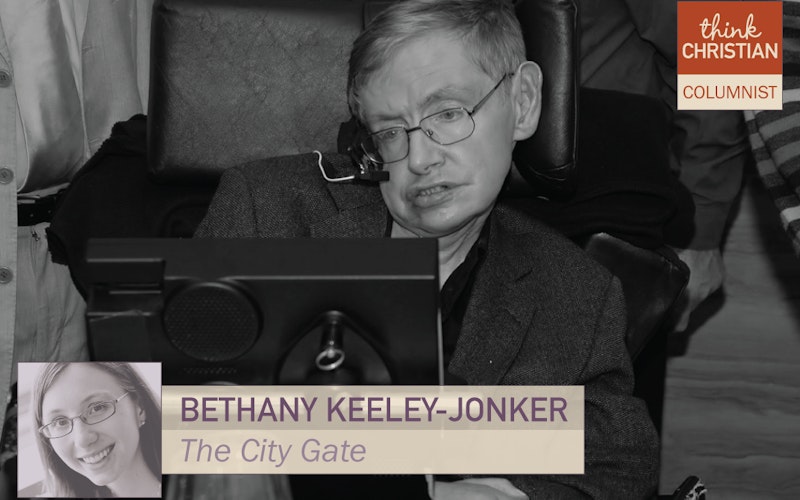
Culture At Large
Stephen Hawking and the body of Christ
In an interesting article in the June edition of Epic magazine, Helene Mialet writes about people’s response to her 10-year ethnographic study of the social fabric (people and machines) that surround Stephen Hawking and allow him to be the Stephen Hawking we recognize and respect. As an ethnographer, Mialet is interested in how Hawking’s ability to do what he does as a scientist is dependent upon the social factors that surround him.
Mialet suggests that while this interdependence is true for everyone, it is particularly true for people we regard as powerful or intelligent, such as presidents or CEOs. The more powerful you are, the more people and technology you need to help you get things done. This is even truer for Hawking, whose disability makes him reliant on technological and human assistance to do even basic things, such as speaking. Mialet suggests this focus on the social helps us reconsider our understanding of how individuals and groups work: “Thus we can’t talk anymore about the individual versus the collective, the individual against the collective or the self-made man, for we see that an individual is a collective.”
When Mialet first published about her study in 2013, people were upset and wondered if she was trying to take something away from Hawking. In actuality, she simply made visible the mechanisms that challenge our idea of the solitary genius. We like to think about and admire people who are capable of big thoughts, and we imagine them developing these big, important ideas alone and apart from society. In reality, though, most important ideas are developed in community – in partnerships or groups, in conversation with others, in departments or congregations.
As a member of Western society, this is challenging information. What does it mean to admire somebody like Stephen Hawking or Steve Jobs when so much of their singularity is made possible by the support of others? It challenges my default ideas around individualism and independence.
Scientists aren’t just brains making discoveries - they are embodied people working in community.
As a member of the body of Christ, though, Mialet’s observations ring true with my understanding of the Christian life. Of course, we know that all of our achievements are made possible by God’s goodness to us, but God’s blessings are not as direct as we often imagine. God gives us grace through the help, support and inspiration of others. When I think of the accomplishments I’m most proud of, it’s humbling to realize how much other people’s work made those things possible.
When we realize that nobody is, as John Donne said so long ago, an island, it messes with our ideas of our own power in the world. Of course, this complex interdependence doesn’t mean that each of us is powerless. It means we can contribute to the growth, joy and accomplishment of others just as we need others to really be ourselves. This has long been an insight of the Christian tradition, even if it rankles our rugged individualist American values.
The good news, then, is that scientists aren’t just brains making discoveries - they are embodied people working in community. Stephen Hawking’s particular body helps make that clear, and reminds us how none of us can do much without our communities. We are all the body of Christ, incorporated. Without Him, and without each other, we are nothing.
Topics: Culture At Large, Science & Technology, Science, Technology, Theology & The Church, The Church, News & Politics, Social Trends